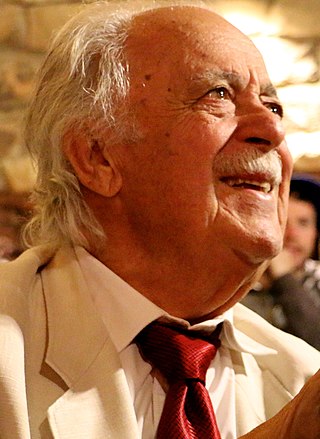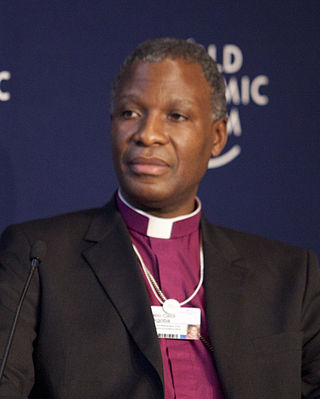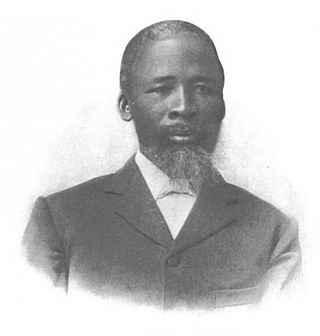
Soweto is a township of the City of Johannesburg Metropolitan Municipality in Gauteng, South Africa, bordering the city's mining belt in the south. Its name is an English syllabic abbreviation for South Western Townships. Formerly a separate municipality, it is now incorporated in the City of Johannesburg Metropolitan Municipality, and one of the suburbs of Johannesburg.

Winnie Madikizela-Mandela, also known as Winnie Mandela, was a South African anti-apartheid activist and politician, and the second wife of Nelson Mandela. She served as a Member of Parliament from 1994 to 2003, and from 2009 until her death, and was a deputy minister of arts and culture from 1994 to 1996. A member of the African National Congress (ANC) political party, she served on the ANC's National Executive Committee and headed its Women's League. Madikizela-Mandela was known to her supporters as the "Mother of the Nation".

Nontsikelelo Albertina Sisulu OMSG was a South African anti-apartheid activist, and the wife of fellow activist Walter Sisulu (1912–2003). She was affectionately known as "Ma Sisulu" throughout her lifetime by the South African public. In 2004 she was voted 57th in the SABC3's Great South Africans. She died on 2 June 2011 in her home in Linden, Johannesburg, South Africa, aged 92.

Christiaan Frederick Beyers Naudé was a South African Afrikaner Calvinist Dominee, theologian and the leading Afrikaner anti-apartheid activist. He was known simply as Beyers Naudé, or more colloquially, Oom Bey.

George Bizos was a Greek-South African human rights lawyer who campaigned against apartheid in South Africa. He was noted for representing Nelson Mandela during the Rivonia Trial. He instructed Mandela to add the qualification "if needs be" to his trial address, which is credited with sparing him from a sentence of death. Bizos also represented the families of anti-apartheid activists killed by the government, throughout the hearings of the Truth and Reconciliation Commission.
Orlando is a township in the urban area of Soweto, South Africa. The township was founded in 1931 and named after Edwin Orlando Leake, Mayor of Johannesburg from 1925 to 1926. It is divided in two main areas: Orlando West and Orlando East.

Orlando Stadium is a multi-purpose stadium in Soweto, a township in Johannesburg, in Gauteng province in South Africa. It is the home venue for Orlando Pirates Football Club, a professional soccer team that plays in the Premier Soccer League and owned by the City of Johannesburg.

The Methodist Church of Southern Africa (MCSA) is a large Wesleyan Methodist denomination, with local churches across South Africa, Namibia, Botswana, Lesotho and Eswatini, and a more limited presence in Mozambique. It is a member church of the World Methodist Council.

Desmond Tutu was a South African Anglican bishop and theologian, known for his work as an anti-apartheid and human rights activist. He was Bishop of Johannesburg from 1985 to 1986 and then Archbishop of Cape Town from 1986 to 1996, in both cases being the first black African to hold the position. Theologically, he sought to fuse ideas from black theology with African theology.

Thabo Cecil Makgoba KStJ is the South African Anglican archbishop of Cape Town. He had served before as bishop of Grahamstown.
James Seipei, also known as Stompie Moeketsi or Stompie Sepei, was a teenage United Democratic Front (UDF) activist from Parys, South Africa. He and three other boys were kidnapped on 29 December 1988 by members of Winnie Mandela's bodyguards. He was murdered on 1 January 1989, the only one of the boys to be killed.

Mvumelwano Mvume Dandala is a former presiding bishop of the Methodist Church of Southern Africa and a former head of the All Africa Conference of Churches. He was the presidential candidate of the COPE in the 2009 South African general elections.

Bonginkosi Success Madikizela is a South African politician.

Seth Mokitimi (1904–1971) was a significant leader in the Methodist Church of Southern Africa (MCSA) during the 20th century. He fostered the development of education, especially theological education, and promoted the use of education as a tool in the struggle for liberation from apartheid in South Africa. Seth Mokitimi was also influential in the youthful development of several important South African leaders, among them Nelson Mandela. In 1963 the MCSA annual Conference elected Rev. Seth Mokitimi as their first black president, in which position he served one term during 1964 and 1965.
At the MCSA Conference of 2007, 36 years after his death, a proposal that the new Methodist Seminary to be built at Pietermaritzburg be named after Seth Mokitimi was approved with "overwhelming enthusiasm".

Thandi Ruth Modise is a South African politician who is currently serving as the Minister of Defence and Military Veterans. She was previously the Premier of the North West from 2010 to 2014, Chairperson of the National Council of Provinces from 2014 to 2019, and Speaker of the National Assembly from 2019 to 2021.

James Mata Dwane, priest and founder of the Order of Ethiopia.

Canaan Sodindo Banana was a Zimbabwean Methodist minister, theologian, and politician who served as the first President of Zimbabwe from 1980 to 1987. He was Zimbabwe's first head of state after the Lancaster House Agreement that led to the country’s independence. In 1987, he stepped down as President and was succeeded by Prime Minister Robert Mugabe, who became the country's executive president. In 1997, Banana was accused of being a homosexual, and after a highly publicised trial, was convicted of 11 counts of sodomy and "unnatural acts", serving six months in prison.
Abu Baker Asvat, also known as Abu Asvat or Abu nicknamed Hurley was a South African medical doctor who practised in Soweto in the 1970s and 1980s. A founding member of Azapo, Asvat was the head of its health secretariat, and involved in initiatives aimed at improving the health of rural black South Africans during Apartheid.

Purity Nomthandazo Malinga is a South African Methodist bishop and the 100th Presiding Bishop of the Methodist Church of Southern Africa (MCSA). Malinga was ordained to the Christian ministry in 1988, the fourth woman to be ordained in her denomination. In 1999, she became the first woman to be elected as a bishop in the MCSA, and served nine years as the bishop for the Natal Coastal region. She later became director of the MCSA's Education for Ministry and Mission Unit, which holds responsibility for overseeing theological education within the denomination. She is the first woman to become presiding bishop for the MCSA; she was elected to that position in 2019, succeeding Bishop Ziphorzihle Siwa. The MCSA is the largest mainline Protestant denomination in Southern Africa and includes churches in Eswatini, Lesotho, Namibia, Botswana, Mozambique and South Africa.
Sankie Dolly Mthembi-Mahanyele, formerly known as Sankie Mthembi-Nkondo or Sankie Nkondo, is a South African politician, diplomat, and former anti-apartheid activist. She was the Minister of Housing from 1995 to 2003 and served as Deputy Secretary-General of the African National Congress (ANC) from 2002 to 2007.
















